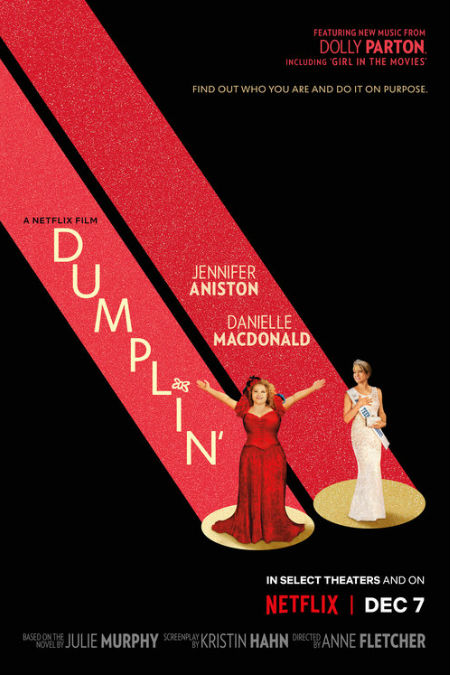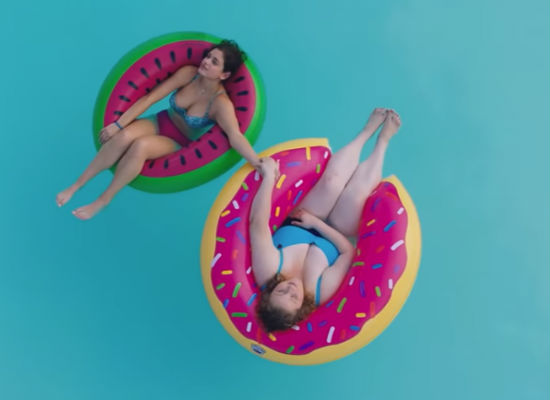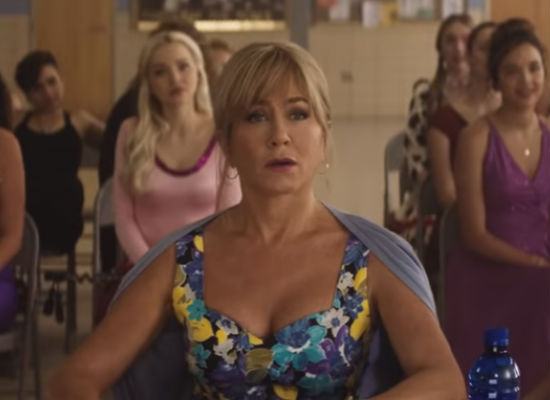
It will surprise exactly no one that we live in a world unforgiving of difference.
If you slip neatly into the box marked “acceptability”with a minimum of fuss and a marked absence of flamboyance and free thought, you are patted on the head, awarded a gold star and sent on your subsequently un-merry way.
Dare to deviate it by choice or an accident of birth and … well, you are Willowdean “Dumplin'” Dickson (Danielle Macdonald), a plus-size girl who, thanks to her mother Rosie’s (Jennifer Aniston) reigning role as the queen of pageantry in their small Texan town of Clover City, inhabits a distinctly un-plus size world.
Her only saviours are close friend Ellen “El” Dryver” (Odeya Rush), Aunt Lucy (Hilary Begley) and co-worker at Harpy’s Hamburgers Bo Larson (Luke Benward) who accept her without condition or question, a rarity for a young woman who has spent her life feeling very much the Other.
It’s not that her mother doesn’t love her; thanks to an impressively-understated performance by Aniston, you quickly realise its more about being confounded by each other that not loving each other, a gaping chasm that isn’t breached until well into this warm and engaging film.
The one person who did get her and raised her until her recent death was Rosie’s sister Lucy, a woman who didn’t lose the weight her sibling did “right before high school” (it seems to be long-running refrain) and who chose to celebrate who she was without any shame or embarrassment.
Hers was a world of vibrancy, unapologetic confidence and an enduring love of Dolly Parton, from whose music, which fills the movie at every possible, perfectly-placed opportunity (she and Linda Perry created the soundtrack together), she drew a profoundly-individualistic life philosophy which held up being yourself as the greatest achievement.

Her wise words of Parton-esque lyricism – “to get the rainbow, you have to have the rain” and “find you who you are and be it on purpose” (both paraphrased) resonate again and again through Dumplin’ which doesn’t raise itself up as some sort of tiresome anti-mainstream orthodoxy which trounces that in which it doesn’t believe with the same polemic brutishness that the reigning school of thought does.
In fact, the screenplay by Kristin Hahn rather cleverly doesn’t trash the world of pageantry nor reduce its participants, many of whom are well-meaning if a tad too glossy, to hateful caricatures.
Rather, it gives the world of Willowdean, and new close friends Millie Michalchuk (Maddie Baillio) and Hannah Perez (Bex Taylor-Klaus), room to breathe, to strut its stuff in a way that affirms in ways charming and movingly funny that there is room for more than one approach to life and dammit they’re going to live it, even in the face of all hairspray and glitter.
It’s this nuanced and gorgeously-human championing of ideals beyond the mainstream that gives the film such a resounding heart as Willowdean and her co-conspirators launch a revolution to subvert the world of pageantry with their plus-sizes and in Hannah’s anti-heteronormative world view by entering the very world from which they have hitherto been excluded.
That they end up transformed in unexpected ways by the experience doesn’t for a second reduce the impact of what they set out to achieve.
By film’s end, pageantry is alive and well thank you very much, its cheesily-glossy vigour intact, but Willowdean especially has found a way to make her own mark within a world that champions the physical ideals of the pageant girls, exemplified by the earnestly-likeable Bekah Cotter (Dove Cameron), finding a new love of self-acceptance that opens up a whole world of possibilities, one of them giddily romantic.
That Dumplin’ achieves this without once feeling like a half-baked, emotionally-manipulative railing against the orthodoxy, its heart and humanity very much on display in ways that feel authentic and palpably possible, says a great deal about the story, based on the YA novel of the same name by Julie Murphy and directed with powerful restraint by Anne Fletcher who understands the message the film is sending and how best to deliver without once feeling heavy-handed.

The film’s fairytale elements which include Dolly Parton-championing drag queens such as Candee Disch (Ginger Minj) and Lee Wayne / Rhea Ranged (Harold Perrineau) who stage weekly Parton homages the aptly-named The Hideaway, were close friends of Lucy and who act as fairy style and performance godmothers for Willowdean, Millie and Hannah fit seamlessly into a story that recognises the world is a cold, unforgiving place and some unconditional, sequin-festooned love and acceptance can go a long way.
In some ways there is nothing narratively new about Dumplin’ which takes a fairly-conventional approach to a story about finding yourself when you are wholly different from the prevailing ethos around you.
It’s how it tells its story which is powerful, heartwarming and moving, offering up the idea that you can be yourself, that you can own your differences and find your own place in a world that will likely not give up much to accommodate you.
In other words, the revolution might be televised but it won’t leave that much unchanged afterwards.
What will change is you, although Willowdean and her friends don’t so much change as simply embrace who they are and get those around them, such as Rosie who goes through her own emotional and yes, fashion, transformation, to embrace them more fully too.
Dumplin’ is told in such a way that you will be clapping and cheering, screaming with unadulterated delight at many of the film’s many brilliantly-captivating, emotionally-resonant moments, cheering on sassy, funny, vulnerable Willowdean and her co-conspirators as they step into our coldly, unforgiving world, and find that thanks to the gospel of Dolly and some fairly-powerful self-belief that grows immeasurably as the film goes on, that there is a place for them and it’s a damn satisfying, wholly-wonderful one too.